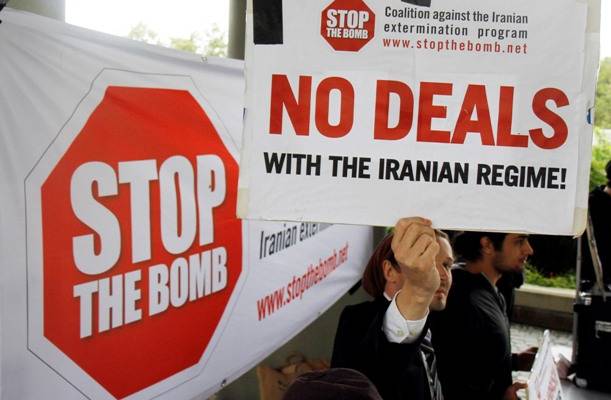
Ohio State Treasurer Josh Mandel, a leader in the Defund Iran Initiative. (AP/Tony Dejak)
The Defund Iran initiative, led by a number of Republicans to achieve divestment from Iran, is initially targeting five states, but aims to reach many more.
A group led by past and current Republican officeholders has launched an effort in some presidential battleground states to place measures on the 2016 ballot that seek to prohibit public investments in certain companies doing business in Iran.
The Defund Iran Initiative, announced Tuesday, is initially targeting Arizona, Colorado, Florida, Missouri and Ohio, but organizers say they hope to pursue similar measures in as many as half the states.
The initiative comes as the Republican-led Congress appears increasingly unlikely to be able to rally enough Democrats to block the Iran deal backed by President Barack Obama‘s administration. The deal would ease sanctions on the country in exchange for dismantling much of its nuclear weapons program for the next decade.
About 30 states already have Iran-divestiture laws or policies. Some of those have gradually loosened since being adopted about decade ago.
The proposed initiatives would fortify those through constitutional amendments or, in some states, through laws that would enhance policies previously adopted by public pension boards.
Bring the ‘Radical Islamic Regime…to its Knees’
Ohio Treasurer Josh Mandel said the effort would help ensure “that the radical Islamic regime in Iran is brought to its knees.”
“I think we can both keep the tax money and the pension money away from terrorist-sponsored nations and also make a good return on behalf of the taxpayers,” said Mandel, an honorary national co-chairman of the group.
Others involved in the effort include Arizona House Speaker David Gowan and Missouri state Sen. Eric Schmitt, the chamber’s Republican caucus chairman who is running for state treasurer in 2016.
In Colorado, where Democrats control the House and Republicans the Senate, the measure will be pursued as a ballot initiative. But Republicans in states with GOP-controlled legislatures said Tuesday that they will first try to refer the measures to the ballot themselves.
‘Message of Opposition’ to the Nuclear Deal
The proposed ballot measures would affect nations listed as of January 2015 by the US State Department as sponsors of terrorism. That includes Iran, Sudan and Syria. It also could include Cuba, which was removed from the State Department’s list on May 29, although that country was not mentioned by initiative organizers.
The investment prohibition would apply to businesses dealing in military equipment, oil, energy production or other “strategic industries.”
Republican lawmakers in several states touted the proposal as a way to send a message of opposition to the nuclear agreement’s easing of sanctions against Iran. But by the time voters go to the polls, the agreement could already be in effect.
Past efforts to target certain countries by limiting public investments have faced some significant challenges. By restricting the potential investment pool, public pension and endowment funds face a greater risk of losses if they fail to keep track with benchmark indexes during a volatile market, said Andrew Karolyi, a finance professor at Cornell University who specializes in international financial markets.
He said it also is difficult to determine which companies should be subject to such policies.
“There’s a lot of gray area that will make it challenging to operationalize these strategies,” Karolyi said.
Organizers have a goal of raising about $10 million nationally to pursue the ballot initiatives, said chairwoman Sarah Steelman, a former Missouri treasurer. She pushed the state’s main retirement system in 2005 to begin screening its investments for companies with ties to countries sponsoring terrorism.
By: AP

Sign the Petition to Stop a Nuclear Iran
The US Congress must ensure that sanctions against Iran remain in force until the nuclear threat is completely eliminated.
I strongly oppose easing sanctions before the nuclear threat from Iran has been eliminated. Allowing Iran to enrich uranium without being subject to 'anytime, anywhere' inspections is extremely dangerous and unacceptable. Iran's nuclear program must be stopped.
See our Privacy Policy